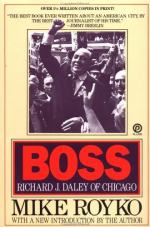
|
| Name: _________________________ | Period: ___________________ |
This test consists of 15 multiple choice questions and 5 short answer questions.
Multiple Choice Questions
1. What was Richard Daley's advice to city officials getting money on the sly?
(a) Don't get caught.
(b) Cut me in.
(c) Read him his rights.
(d) Find a lawyer.
2. What was one of Richard Daley's first achievements as mayor?
(a) He got federal funds to make Chicago streets part of the Interstate Highway system.
(b) He sought and received increased tax revenue through the Republican Governor of Illinois.
(c) He established a new affordable bus service to enhance mass transit.
(d) He won additional funds for Chicago public schools.
3. How were patronage jobs issued in Chicago?
(a) They were distributed to ward committeemen who delivered the highest voter turnout.
(b) They were bid upon by qualified candidates.
(c) Applications were taken and candidates went through a stringent interview process.
(d) The mayor gave them to the precinct where he had the most friends.
4. Why is the Chicago race riot of 1919 an important event in Richard Daley's history?
(a) He used his negotiating skills to calm down competing gangs.
(b) The violence forced his family to move where he made contacts that shaped his career.
(c) He was nearly killed in a counter attack that took place on the street where he lived.
(d) He was rumoured to be a leader of one of the gangs involved in violence.
5. Why did Richard Daley earn a nickname while he was using public funding for various public works projects?
(a) The country witnessed his tough political tactics first hand.
(b) He took personal risk in supporting Adalai Stevenson's nomination for a second run against President Eisenhower.
(c) He improved the downtown and lake front areas and upgraded O'Hare from a military airport to one of the nation's state of the art commercial airports.
(d) He was behind massive urban renewal developments in poor minority areas of Chicago.
6. What nickname did Richard Daley earn while national attention was focused on Chicago?
(a) "Dick the bruiser."
(b) "Dick the builder."
(c) "Richard the lionhearted."
(d) "Daley the developer."
7. What was Richard Daley's family background?
(a) Polish laborer.
(b) German farm stock.
(c) British gentry.
(d) Irish Catholic.
8. How were many of the precinct committee positions earned through the years?
(a) Through family connections or nepotism.
(b) Through paying for favors or graft.
(c) Through winning public support for a cause or virtue.
(d) Through hard work or devotion.
9. When Joe McDonough was elected to County Treasurer, what happened to Richard Daley?
(a) Daley was left in Chicago City Hall where he eventually became a rival to McDonough.
(b) Daley decided to set his own course and run for state senate.
(c) McDonough kept Daley in his office as an aide.
(d) The two split and Daley continued to pursue his career in City Hall.
10. What organizations gave Richard Daley his most loyal support?
(a) Public schools.
(b) Law enforcement agencies.
(c) Labor unions.
(d) Bowling leagues.
11. Who did Richard Daley usually see first when he arrived at his office?
(a) The Chief of Police.
(b) His secretary.
(c) His chief of staff.
(d) The press.
12. What is the topic of Chapter I?
(a) Richard Daley's political growth.
(b) Chicago's transformation under Richard Daley's rule.
(c) Richard Daley's daily routine.
(d) Richard Daley's boyhood home.
13. What would happen to ward committeemen if they did not deliver votes on election day?
(a) They lost their position with the Cook County Democratic Central Committee.
(b) The Democratic Party poured more campaign funds in his area for the next election.
(c) Their precinct lost funding for projects he requested.
(d) He would end up, "sleeping with the fishes."
14. Where were the headquarters of the Chicago Democrat Party in relation to Richard Daley's office?
(a) Across the street.
(b) In the public library.
(c) Near Comisky Park.
(d) On the south side of Michigan Avenue.
15. How old was Richard Daley when he became a precinct captain for a South Side ward?
(a) 35.
(b) 25.
(c) 17.
(d) 21.
Short Answer Questions
1. Richard Daley and who else knew how many patronage jobs existed?
2. What did Royko describe as Richard Daley's character traits?
3. What happened when the incumbent mayor before Richard Daley made his appeal before the Cook County Central Committee that was chaired by Daley?
4. To whom was Richard Daley most loyal according to Royko?
5. What personal relationship was Richard Daley maintaining that gave him the incentive to do well when he was working for Joe McDonough in the Cook County Treasurer's Office?
|
This section contains 826 words (approx. 3 pages at 300 words per page) |

|




